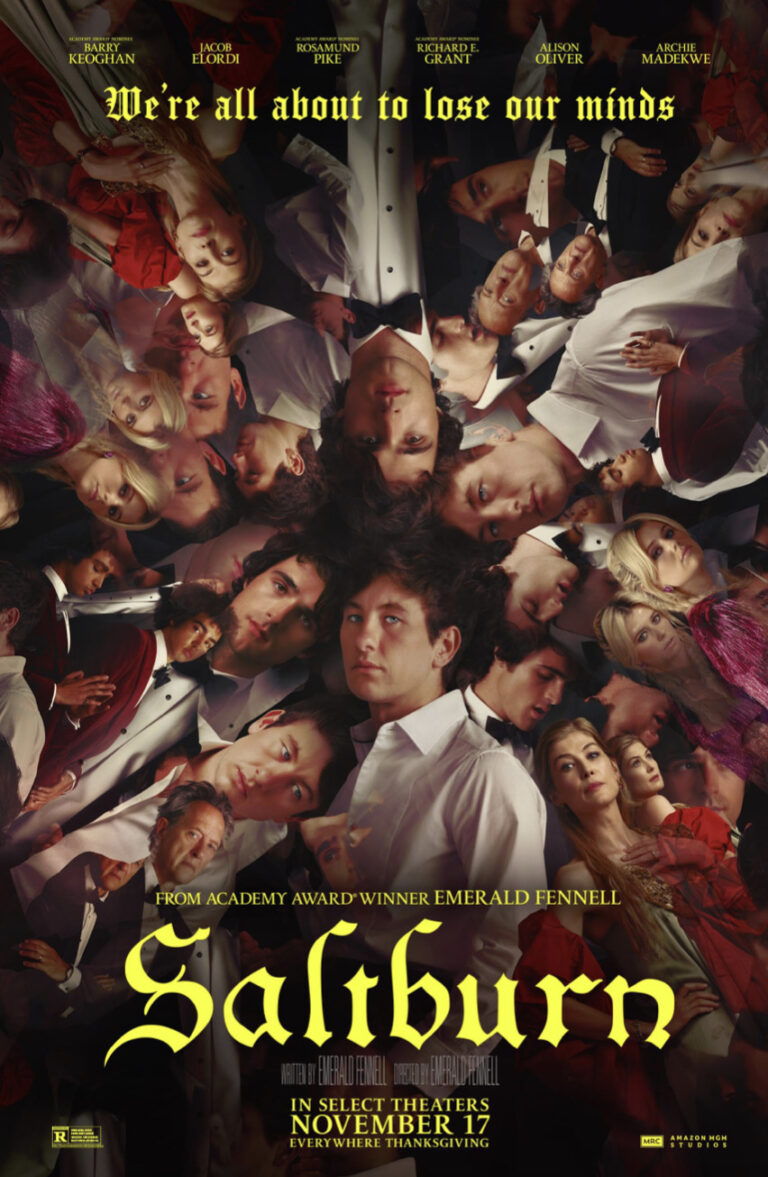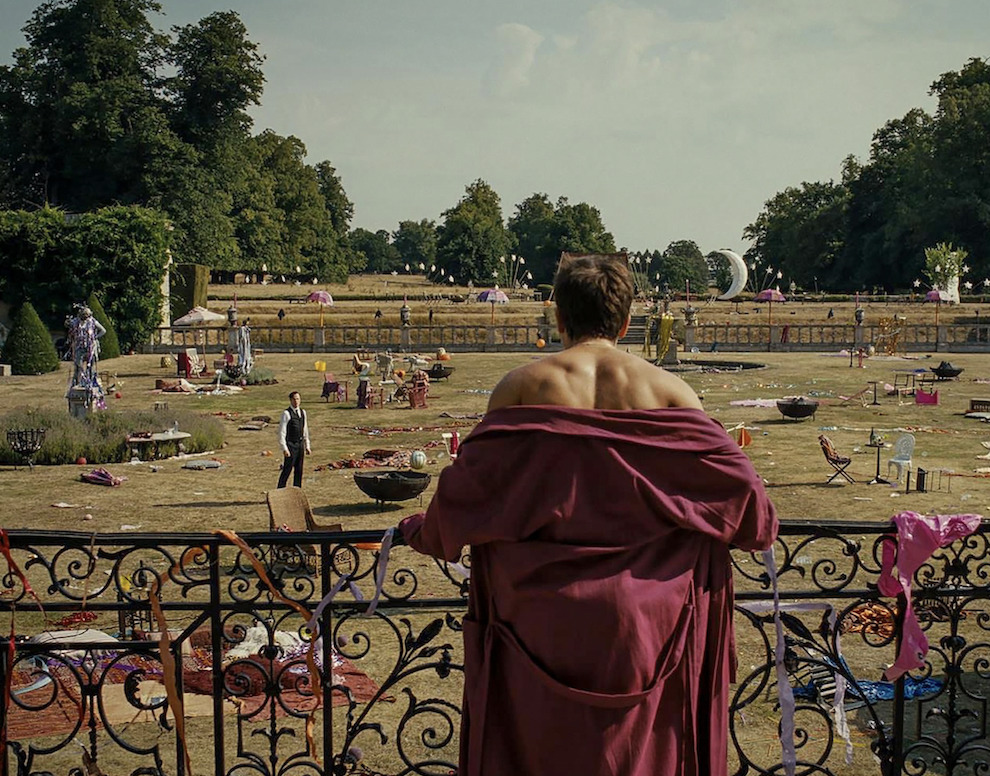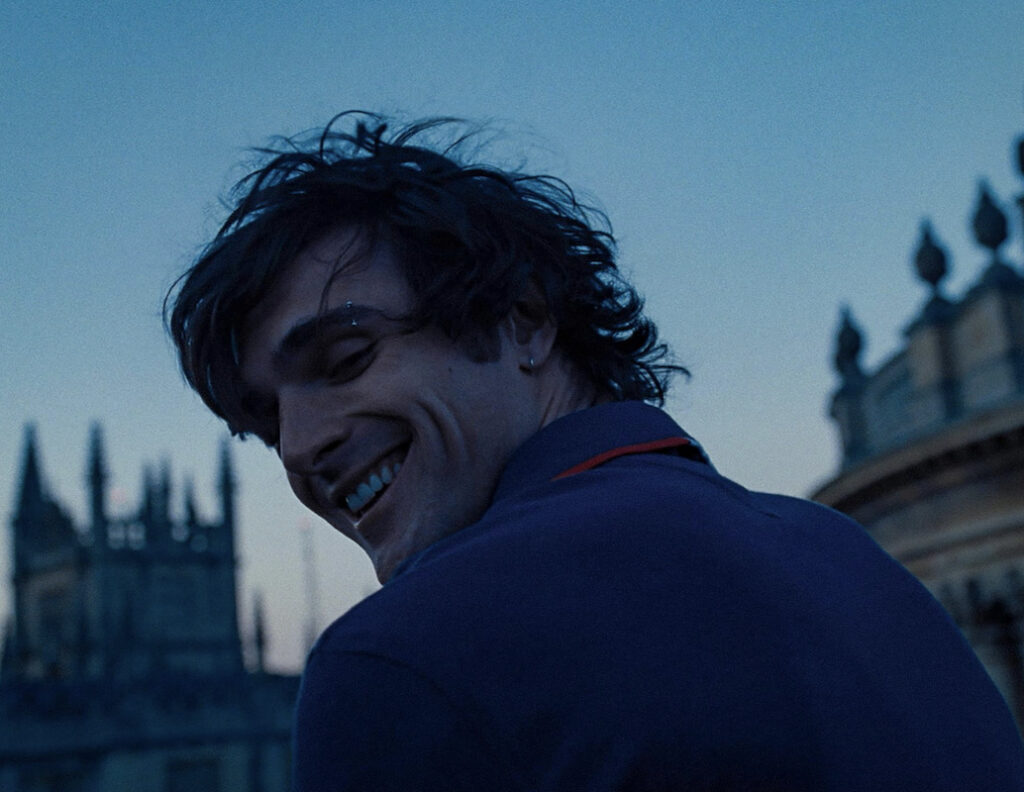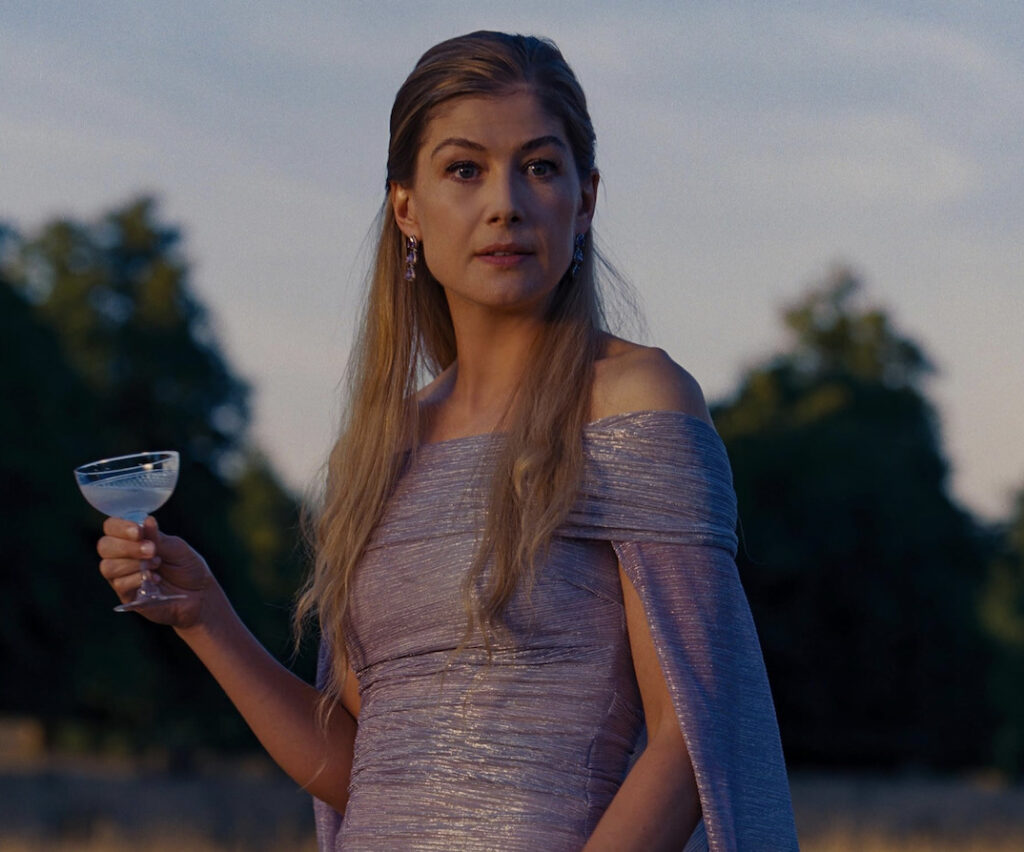
“Promising Young Woman” Director Emerald Fennell tackled her latest film, “Saltburn” which brings us a beautifully wicked tale of privilege and desire. Struggling to find his place at Oxford University, student Oliver Quick (Barry Keoghan) finds himself drawn into the world of the charming and aristocratic Felix Catton (Jacob Elordi), who invites him to Saltburn, his eccentric family’s sprawling estate, for a summer never to be forgotten.
The film opened the London Film Festival, and it has been showing at many festivals around the world, such as Telluride, Rome, Stockholm, Zürich, Poland, Australia. I was lucky enough to listen to an amazing conversation on a highly anticipated film.
 @Photo by Courtesy of Prime – © Amazon Content Services LLC
@Photo by Courtesy of Prime – © Amazon Content Services LLC
Press Conference with Director Emerald Fennell and Producer Josey McNamara
Q : A big shout out to your production designer, and of course Linus Sandgren, your cinematographer. Every character is so fully realized and dynamic. I just want to get your take on assembling the best of the best here with Barry and Jacob and Richard E. Grant and, of course, Rosamund Pike.
EMERALD: Absolutely. Well, I think in many ways it’s kind of similar to dating. What you’re looking for is chemistry. You’re looking for that element of sort of surprise. So, I like to meet people first, and kind of talk to them and see if we’re gonna get into it. That we’re gonna have a good time, we’re gonna trust each other, we’re gonna be able to really get under the skin of something and get inside something. So that’s the first stage. And then we’re talking about actors who are supremely, supernaturally gifted.
Barry is a person who the closer you look, the further away he gets. It’s the most brilliant talent. And, you know, we needed Oliver to be incredibly enigmatic, incredibly alluring, incredibly complicated. And so, Barry is a genius. And you have Rosamund, the funniest, most gifted comic actress in the world. Jacob, a genius. Richard, a genius. And then, you know, Kharmel Cochrane, the unbelievable casting director, who introduced us to Archie and Alison who play Venetia and Farleigh. It’s Alison’s first film, and they are two of the most gifted actors in the world.
Q: Josey, what surprised you about their performances?
JOSEY: Well, I think what I was really impressed with was everyone’s kind of dedication to the movie in terms of what we were doing. And again, credit to Emerald about how she speaks to the movie and how she distills her vision to people, ’cause I think everyone really understood from day one, the movie we’re trying to make, and where we want to push and where we want to pull. It was just really great to see everyone really invest themselves in the movie every day, and not be afraid to do anything or try anything, and be very malleable as well. I think every day we were kind of feeling the movie and seeing what we needed to do, and everyone really was on board with that and willing to go with it.
Q : Barry Keoghan has an unpredictability in “Saltburn.” What was it like knowing you had such a kinetic talent at your disposal and you had to figure out how to make the most of him in this movie?”
EMERALD: It was thrilling. ‘Cause he is a force of nature. Like, Barry is like lightning in a bottle. It’s a very unique and specific talent that he has. And so, I think the thing that you’re always looking for is that element of surprise. The texture of a performance is as much as the texture of the couch they’re sitting on. That is something that is really important. And what I love is things and people that go against the grain. That’s what Barry does. We as humans are not consistent characters.
We have our own idiosyncrasies. We respond to things surprisingly. We are turned on by the things that we don’t like, and we’re disgusted by the things we should. You know, that’s this movie, and that’s what Barry does. He can get inside something. He’s probing, yeah, it is an extraordinary thing. And I think so much of your work as a director is giving people the thing that they need. And so, for me and Barry, so much of it, by the end had a sort of telepathy. I would just give him a look, and he kind of knew what I meant.
 @Photo by Courtesy of Prime – © Amazon Content Services LLC
@Photo by Courtesy of Prime – © Amazon Content Services LLC
Q: The film presents a very intriguing paradox between one’s pursuit for acceptance against someone else’s politics of personal power. So how willing do you think we are to become something we are not just to get approval and appreciation? And is there a danger there?”
EMERALD: I think our life is spent in the pursuit of approval from other people who will never give it to us. And that is the thing. That is being human. We are all of us, like, dedicated to that pursuit. I think we are all enormously slippery and changeable. And, you know, I think whether it’s seduction, the way you present yourself when you’re trying to seduce someone, the way you present yourself when you’re trying to ingratiate yourself with a friendship group, whether you’re trying to ingratiate yourself with a collection of critics through the medium of television, we are all of us looking for approval. We are all of us looking to please. And I’m always very interested in that power dynamic. And I think it’s the root of our society. It’s the root of what it is to kind of live together.
Q: Oliver is such a fascinating character to be at the center of the story, one who really stays with you long after the movie is over, and that is absolutely true. So telling this film from his twisted perspective, it’s such a cool choice, but what is it about Oliver that spoke to you as a writer and creative?
EMERALD: I think that Oliver feels incredibly relatable to me. I think that he kind of announced himself about seven or eight years ago kind of persistently. He’s sort of like an imaginary friend. He was just there all the time, and I couldn’t get him out of my head. And I think it’s no accident to me, I finished writing this during Covid. Because if Oliver’s anything, as well as being the person he is, this is a film about looking constantly and not being able to touch, and what it does to you if you’re not allowed to touch the thing you want to touch.
And we were living in a world where we could only look at each other through screens, that we were constantly voyeuristic, and absorbing things that couldn’t see us back. So I think that for me, Oliver seems to be kind to all of us, he’s an outsider. Yes, he’s a person driven by kind of love and desire and all of those things. But he’s also trying to scratch an itch that cannot be sated. It can’t be scratched. So, what do you do? You, like, scratch your skin till you get down to the bone. What do you do? You do it till it hurts. That’s what he felt to me so much like the embodiment of everything that I was feeling at the time.
Q : Why set the story in 2006 particularly? Why was this so important?”
JOSEY: Well, I think Emerald can obviously answer the whys behind it, but I mean, personally for me, that’s the time I was at university, in the same year going to university.
So, it was incredibly relatable for me to see those textures play out. It was really fun for me to experience it. And there were certain elements that if you think about, smoking indoors, I think it was the last year you were allowed to smoke indoors. So there are these little things that we could add that really built the fabric of the movie. But I think Emerald will probably speak better to the why of it.
EMERALD: And I think it’s absolutely that, it’s a period drama that isn’t a period drama, which is a very useful kind of satirically. I think having just a little bit of distance is helpful. It also is necessary to the structure of the gothic British country house movie, that it is a person looking back over a time that changed their life, whether it’s The Go-Between or Rebecca.
Or even, you know, looking at something like The Great Gatsby, you have a similar thing, an outsider, a young man who claims to be an observer but is actually instrumental in the story. So there’s that. So it always needed to be set to some degree, you know, in the recent past, but also has a very humanizing effect.
And then the thing about Carey, the thing about “Poor Dear,” Pamela is an unbelievably important character in this film because she could so easily be an object of derision. She’s treated so abominably. She’s the person who knows she’s outstayed her welcome and has nowhere to go, so has to suffer the indignity of their derision every day. And the thing is, is that Carey, she’s so gifted as a comic actress, it is such a genius comic performance, but it is also one of the most devastating, kind of poignant ones.
 @Photo by Courtesy of Prime – © Amazon Content Services LLC
@Photo by Courtesy of Prime – © Amazon Content Services LLC
Q: For sure, you have such a great sense of visuals and style. Tell us about the creative process working with the costume department to match wardrobe with character.”
EMERALD: I think every single thing on set is how you tell the story. It’s character, everything. You are making a film, and so therefore you can be expressive. You can be incredibly sort of specific. And “Promising Young Woman: as much as this, costume is character, hair is character. Whether somebody’s got chipped nails or a perfect manicure.
And so costume is one of the most important things that you have as a kind of weapon at your disposal. And this film is about how we present ourselves, how we identify ourselves. And so every single person’s costume is crucial. So, whether you’re looking at Oliver who makes the dreadful mistake of turning up to Oxford having looked like he’s made an effort, he’s immediately crucified for. It’s like the first thing that happens is he’s mocked for his jacket and his scarf and his tie by Farleigh, you know.
And then he kind of has to learn to be kind of cool is to sort of care less. And then, Felix, whose wardrobe is just full of moth-eaten jumpers, you know, his linen shirts are always wrinkled. So we’re always making sure that light is sort of catching, the fact that everything is sort of studiously rumpled. And then you look at someone like Farleigh who is permanently being reminded of his status as a kind of acolyte, not a family member, who has to dress well, who has to dress to amuse in the same way that “Poor Dear” Pamela does.
Farleigh is the only person who’s got a sort of timeless wardrobe in a way ’cause he’s wearing vintage clothes a lot of the time because he knows that part of it is he has to turn up to work every day to earn his place in that house.
Q : What did you find in Jacob Elordi that made him the magnetic central character you were looking for for this story? Tell us about casting Jacob, his screen test.
EMERALD: He’s absolutely amazing. And I think that also in many ways, Felix is the hardest part in this movie because he’s sort of the emotional center. He’s been put immediately on a pedestal by not just Oliver, but the film. And so it was about finding someone who had this unbelievably magnetic charm and charisma, but who was also sort of a gifted actor who understood that this person is still a person, still just a guy.
And that is profoundly what Jacob did. He came in and he gave this performance for his screen test, and it was exactly what I was looking for, which was that he was kind of mortal. He looked like a god, but he’s mortal. And that was something that nobody else could kind of understand. And it’s such a deft, clever bit of comic observation because he sort of sees all of the things that we really needed from Felix.
Yes, he’s beautiful, kind, thoughtful, and he’s got a savior complex. But also, he’s capricious and spoiled and uses his power when he’s threatened, and misogynistic, and all of the things. He’s not as nice as he seems, but we needed someone like Jacob who was so lovable, so beautiful that we don’t really mind that he’s actually kind of a dick.
Q: The film is also produced by Margot Robbie. Is this a result of a real friendship, or did it come out of just a shared business relationship? Talk about your relationship.
EMERALD: Well, I suppose it’s different. I mean, it’s different for you, Josey, as it is for me.
JOSEY: Purely business.
EMERALD: Purely [laugh] business. So obviously, Josey runs the company with Margot and Tom. So, his relationship with her is like, well, I can’t speak for it. But I’ll speak for myself. She’s the greatest and exceptional. The company that she runs with these guys is unbelievable. She produced “Promising Young Woman” as well as “Saltburn.”
I really honestly never want to work with anyone else. Josey, Margot, Tom, they’re all incredible. And you know, what is so remarkable about what she does and what they are doing is that they have proved, like this year more than any, that subversive, smart, complicated, difficult movies can make a serious amount of money, and can be hugely popular.
And you know, everyone said, for example, that “Barbie” was unmakeable. And like, let’s watch it make $2 billion, which it will. You know, “Promising Young Woman,” lots of people wanted to change it, wanted to make it more palatable, make it more marketable, or what they perceived would be those two things. And Margot and Josey and LuckyChap said absolutely not.
This is the movie it is. They’re resolute. They know what they’re doing. They’re really all of them, talented, experienced. She’s a powerhouse. She’ll take over. They’ll take over. And then they’ll dance on the embers of Hollywood and build it into a nice, beautiful, pink palace. You can count on it.
 @Photo by Courtesy of Prime – © Amazon Content Services LLC
@Photo by Courtesy of Prime – © Amazon Content Services LLC
Check out more of Nobuhiro’s articles.
Here’s the trailer of the film.

